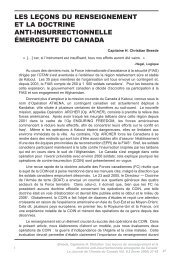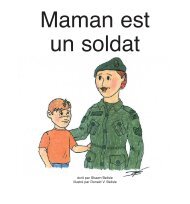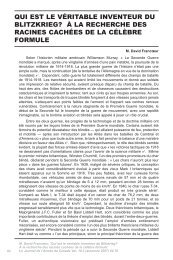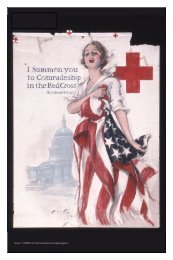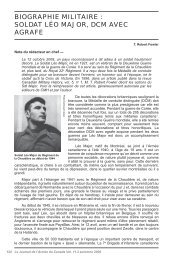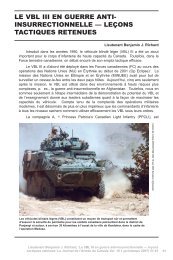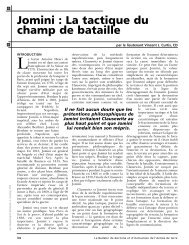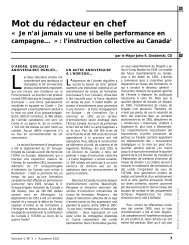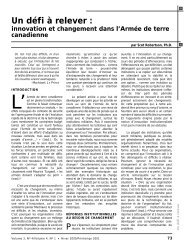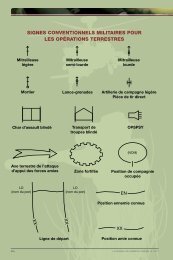The Canadian Army Journal
The Canadian Army Journal
The Canadian Army Journal
You also want an ePaper? Increase the reach of your titles
YUMPU automatically turns print PDFs into web optimized ePapers that Google loves.
118<br />
Guideline 3: Develop partnerships with non-traditional allies; solutions may not<br />
always involve the application of force<br />
Dr Lindsey used the example of Canada’s involvement in Afghanistan to illustrate<br />
this guideline. Operations in Afghanistan draw attention to the requirement of “knowing<br />
the enemy,” including its capabilities and intentions, and to planning operations on the<br />
footbed of good intelligence. He suggested that the situation in Afghanistan seems more<br />
confused than it should be, and that the CF could do more in Afghanistan by developing<br />
partnerships with non-traditional allies: “Maybe the solution lies outside the military. For<br />
example, can we find out what the ‘good’ Muslims think about the situation; those who<br />
do not want to get blown up and are interested in problem solving?” 28 He suggested that<br />
Muslim communities participate in discussions regarding governance challenges with<br />
the Government of Canada, which would facilitate our ability to understand what the<br />
requirements of the local population, the local security forces and their need, versus<br />
telling them what we are going to do to them if they do not cooperate. This, he argued,<br />
would be an active area of research for psychologists or those involved in personal<br />
behaviour analysis. 29<br />
With the importance of sending the right people (not just armed forces) to prosecute<br />
a counter-insurgency campaign being recognized as common to successful counterinsurgencies,<br />
30 Dr Lindsey maintained that <strong>Canadian</strong> police and constabulary forces,<br />
such as the Royal <strong>Canadian</strong> Mounted Police (RCMP), could be used to support more<br />
tasks and reinforce the mission. In addition, Dr Lindsey suggested that there is a need<br />
to examine the system of trust, and understand on the nature of the counter-insurgency<br />
in Afghanistan, including its cultural, political and geographic context: “<strong>The</strong> mistake by<br />
the US in Iraq was that they abolished the army after they invaded. We need to find out<br />
more on how to support Afghan locals, not look down at them through the barrel of a<br />
gun.” 31 Canada’s strategy in Afghanistan is based upon assisting and enabling the<br />
Afghan people to rebuild their country along three ‘pillars’ of activity that are consistent<br />
with the “Afghan Compact,” namely Security, Governance (rule of law, Human Rights)<br />
and Economic and Social Development. 32 This reinforces the notion that military<br />
operations are part of a coordinated and integrated approach among communities<br />
responsible for diplomacy, defence and development.<br />
Guideline 4: Synthesize the “so what” of emerging issues, concepts and<br />
technologies<br />
In a 1950s issue of the <strong>Canadian</strong> <strong>Army</strong> <strong>Journal</strong>, Dr Lindsey wrote an article on “<strong>The</strong><br />
Roles of Radar.” <strong>The</strong> purpose of this article was to outline the basic relationships that<br />
determined the performance of a radar set, and to show how many of the features<br />
conflict with each other. 33 But the role of the analyst is much larger than this: he must be<br />
able to articulate emerging developments in science and technology (S&T), changes in<br />
the geo-political environment and strategic concepts in such a way as to highlight the<br />
potential opportunities, limitations and implications in the context of military<br />
requirements. Extending the scientific frontiers of knowledge is not always a mandatory<br />
requirement for influencing the military combat development process or field operations.<br />
While OR analyses must be timely and relevant, lengthy dissertations are not required<br />
for problems requiring an immediate answer. In other words, it is not necessary to<br />
develop a program when all that is required is a ‘quick-look’ assessment.<br />
Besides acting as a “strategic sensor” in tracking and monitoring emerging<br />
developments and trends, one of the roles of the OR analyst is to realize the potential<br />
application of a new subject, acting as what Dr Lindsey referred to as an “education<br />
<strong>Canadian</strong> <strong>Army</strong> <strong>Journal</strong> Vol. 11.1 Spring 2008


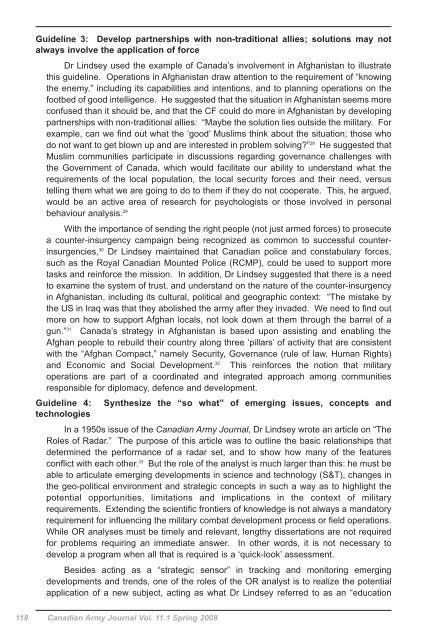
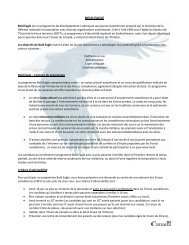
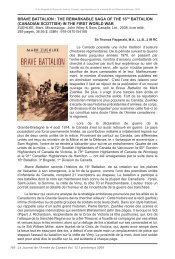
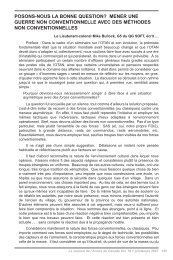
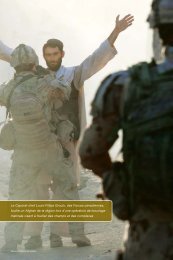
![La modularite dans l'Armee de terre canadienne [pdf 1.6 MB]](https://img.yumpu.com/17197737/1/188x260/la-modularite-dans-larmee-de-terre-canadienne-pdf-16-mb.jpg?quality=85)
